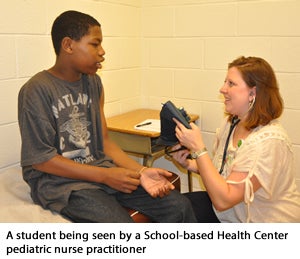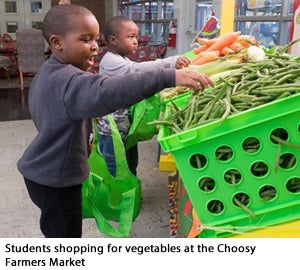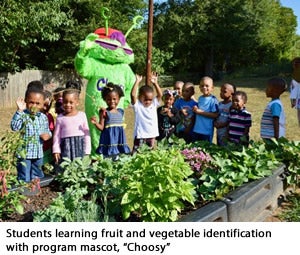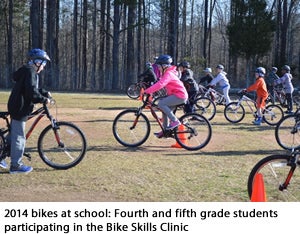Greenville Health System – School Health Program
Greenville, SC
November 2017
Overview
Bradshaw Institute for Community Child Health & Advocacy is an important component of the Greenville Health System (GHS) vision, with a focus on serving children and families directly in their homes, schools and communities. Bradshaw Institute programs are designed to anticipate and prevent the onset of childhood illness and injury by focusing on the social factors that impact the overall wellness of young people. These factors include education, family/social support, and community safety.
Bradshaw Institute’s School Health Program serves the Upstate through innovative education and health promotion initiatives to improve the total health of children. Initiatives include:
 School-Based Health Centers – Bradshaw Institute has established School-Based Health Centers (SBHCs) in one at-risk middle school and three Greenville County designated Title 1 middle schools, where access issues often act as barriers to health care. The Title 1 schools serve students in an area of Greenville County where nine out of 10 middle school students live in poverty. The SBHCs provide on-site medical, social, emotional, and behavioral health services to students. They also connect students and their families to outside health care agencies and medical homes as needed. The program will expand into a nearby high school in 2018 to provide current middle school students with continuity of care.
School-Based Health Centers – Bradshaw Institute has established School-Based Health Centers (SBHCs) in one at-risk middle school and three Greenville County designated Title 1 middle schools, where access issues often act as barriers to health care. The Title 1 schools serve students in an area of Greenville County where nine out of 10 middle school students live in poverty. The SBHCs provide on-site medical, social, emotional, and behavioral health services to students. They also connect students and their families to outside health care agencies and medical homes as needed. The program will expand into a nearby high school in 2018 to provide current middle school students with continuity of care.

Choosy Farm to Belly – This program at SHARE Head Start Centers in Greenville, S.C., is a multifaceted curriculum focused on growing, cooking and sharing food. The program aims to influence food choices and help students and their families make healthy food selections, to increase the number of home-cooked meals in low-income households, and to increase movement and learning in the classroom. Most of the SHARE Head Start children live in homes in a USDA-designated food desert, defined by the USDA as “being more than one mile walking distance to markets selling culturally appropriate, fresh produce.”
Hallways to Health – This initiative aims to change the health culture of schools with SBHCs, and acts upon the belief that health should be taught not only in the health room, but also in the school’s hallways, classrooms, cafeterias and surrounding neighborhoods. The program’s focus is on promoting healthy eating, active living and social and emotional health. Trainings are provided for school personnel on current trending health issues such as childhood obesity and mental health. Medical minutes programming, intentionally tied to the middle school health curriculum, is also delivered in person and/or via video presentations by GHS resident physicians.
 Bike Skills Clinic – This program, aimed at fourth- and fifth-graders, is a skills and safety education curriculum, with the goal of increasing the number of safe youth bicycle riders who ride for both fitness and transportation. Children who participate in the program are reminded that they are worthwhile, they are important enough to be kept safe on their bicycles, and they are capable of learning a new skill.
Bike Skills Clinic – This program, aimed at fourth- and fifth-graders, is a skills and safety education curriculum, with the goal of increasing the number of safe youth bicycle riders who ride for both fitness and transportation. Children who participate in the program are reminded that they are worthwhile, they are important enough to be kept safe on their bicycles, and they are capable of learning a new skill.
Impact
The SBHCs have resulted in reduced absenteeism (94 percent of students return to class, avoiding an absence). In 2016/17, the SBHCs completed more than 200 student sports physicals, providing students with the opportunity to become physically active and engaged on a school team. Referrals to primary care medical homes were made in 35 percent of SBHC visits. After participating in Choosy Farm to Belly in 2016, 90 percent of parents reported their children eating vegetables, 94 percent of parents reported preparing meals as a family, and 98 percent of parents reported eating meals together as a family, representing a 49 percent increase by the same families before starting the program. More than 6,000 students have taken part in the Bike Skills Clinic since its launch; 75 percent of students who did not know how to ride prior to the program learned to ride.
Lessons Learned
Through any program in School Health, building strong partnerships with school districts and other community organizations with shared responsibility is vital to impacting the populations we serve. Using evaluation results to report impact to partners and other stakeholders keeps them engaged and invested in the programs.
Future Goals
School Health aims to expand SBHCs and the Choosy program to other schools and child development centers in areas struggling with health disparities, and to food deserts that feed into schools with existing School Health programs to gather longitudinal data and increase our reach.
Contact: Cathy Jones
Major Gift Officer, Philanthropy
Telephone: 864-797-7854
Email: cathyjones@ghs.org

